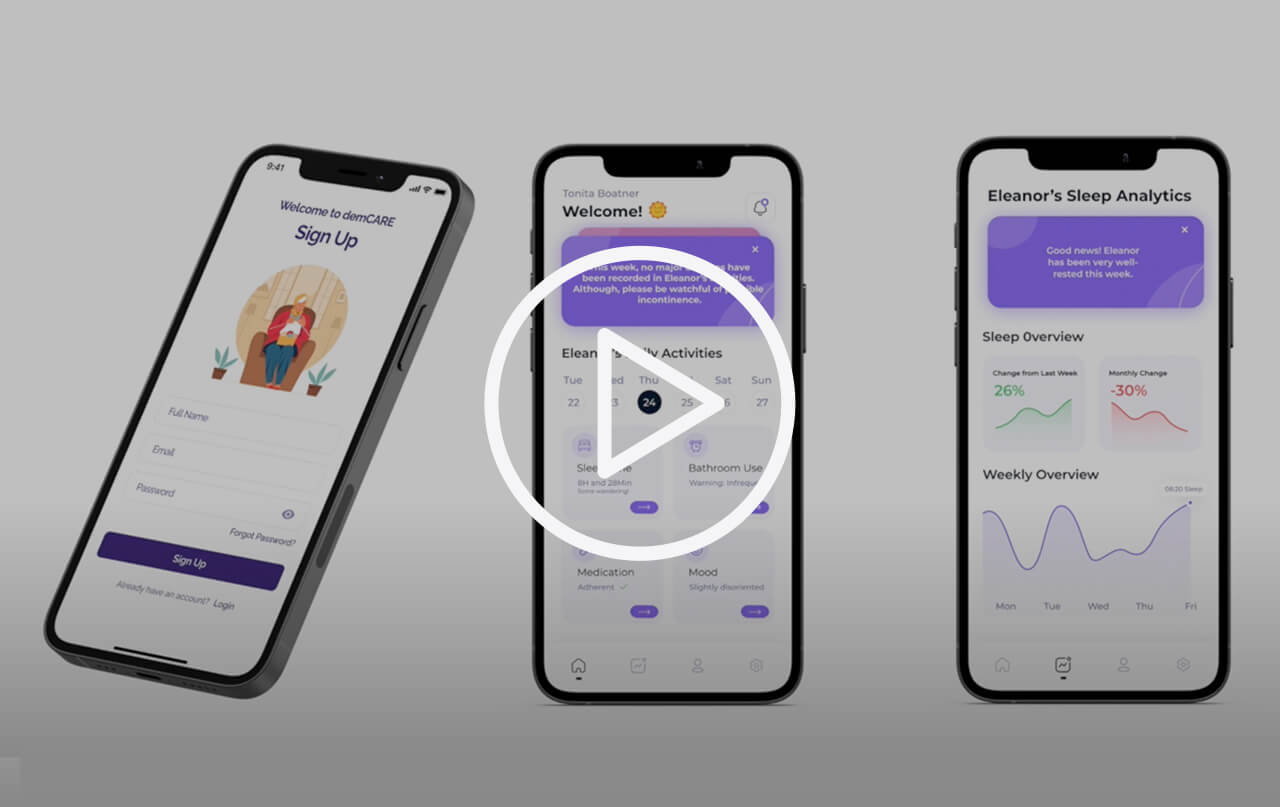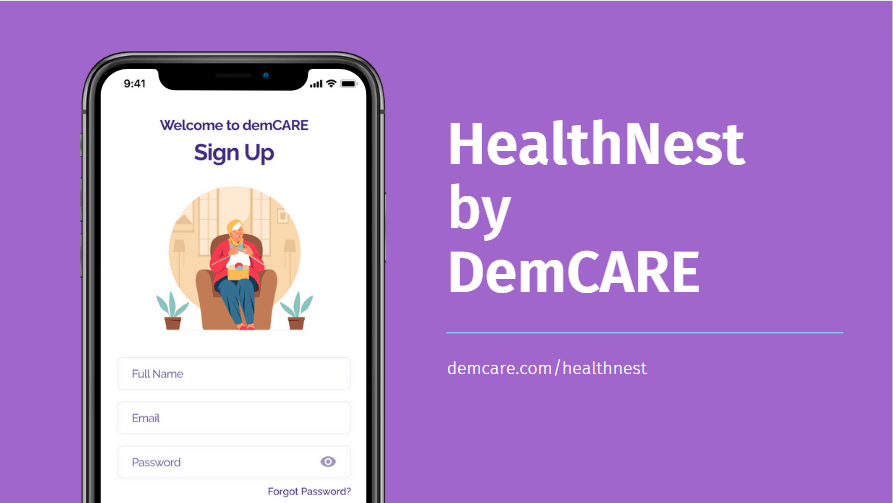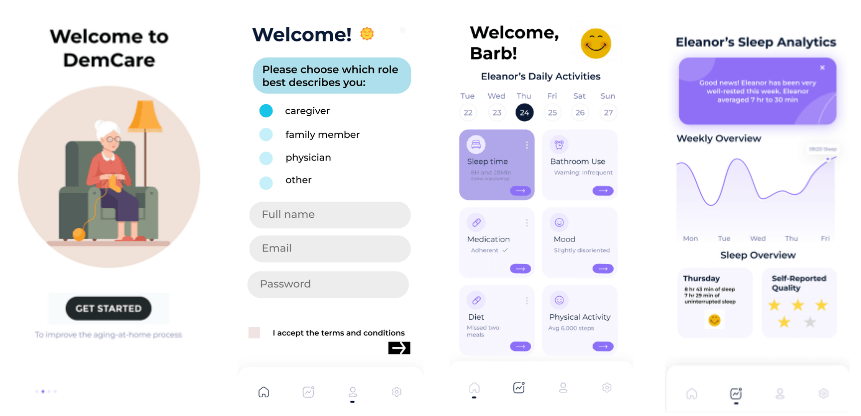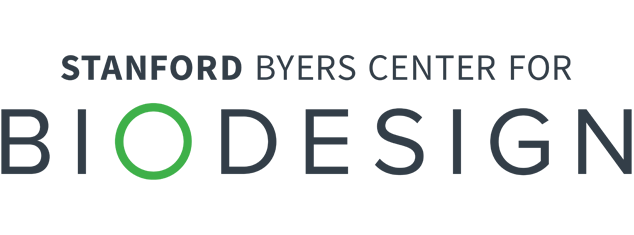Health Technology Showcase
Five Questions and an Elevator Pitch: DemCare
 Richa Upadhyay and Riya Karumanchi discuss the challenges faced by caregivers of patients with dementia and how their product, HealthNest, can provide information to manage those challenges while respecting the patient’s privacy and dignity.
Richa Upadhyay and Riya Karumanchi discuss the challenges faced by caregivers of patients with dementia and how their product, HealthNest, can provide information to manage those challenges while respecting the patient’s privacy and dignity.
1. What is the need that your project seeks to address?
Riya: Caring for patients with dementia can be really challenging, especially for part-time caregivers who may only see their patients a few times a week. One major obstacle they face is accurately tracking changes in health, behavior, and cognition. This can result in guesswork when it comes to providing the best care.
For example, a caregiver who sees their patient once on a Sunday, and next on a Thursday, may not be aware of changes in medication, diet, bathroom use, and other activities of daily living that can affect a patient's mood and how they should best care for them.
Continuous data collection of activities of daily living is needed to help reduce guesswork and to encourage more informed care decisions to improve a patient's health outcomes.
For many people, 24/7 care is unaffordable so they hire a part-time caregiver. But people with dementia can’t necessarily communicate important changes throughout the week – what they were eating, their medication adherence, and how they were feeling – to their caregivers.
Ultimately, we want to bridge the information gap between caregivers and patients with dementia, so that the caregivers and physicians can make more informed decisions and provide higher quality care. Caregivers and physicians can have more accurate and reliable data to guide their decisions while patients enjoy greater independence and quality of life.
2. How does your solution work?
Riya: We developed a digital and hardware solution that helps support aging in place, called HealthNest. It's a ‘smart home in a box’ that includes an automatic medication dispenser, a smart speaker, and sensors that provide a detailed summary of the patient's activities of daily living for family members, caregivers, and physicians to review.
Richa: Right now, the main activities we're focusing on are sleep, bathroom use, and medication adherence. Those choices were guided by the conversations we had with caregivers and caregiving companies. In the future, we hope to expand to also track diet, nutrition, exercise, cognition, and other activities.
Our main priority is twofold: We don't want to require any work or engagement from the patients. We want it to be passive, so they don't have to think about it. It's not like wearable technologies where they have to press buttons. Once it's set up, it’s hands off.
Our second priority is maintaining the patients’ independence and privacy. A lot of health technologies that support aging at home can feel invasive, like surveillance with cameras.
 HealthNest by DemCare is a ‘smart home in a box’ for people living with dementia, as well as the people who care for them.
HealthNest by DemCare is a ‘smart home in a box’ for people living with dementia, as well as the people who care for them.
3. What motivated you to take on the project? And what activities have you undertaken?
Riya: Our initial introduction to the subject was in the Biodesign for Digital Health class, where we learned about the demand for elderly care. With the growing aging population, healthcare needs to move in this direction to address those needs.
We searched for caregivers on LinkedIn and polled, emailed, and messaged as many people as we could. We sent more than 500 invites to people and a lot of them were very kind and generous with their time. Some caregivers were open to being advisors.
A lot of them said, ‘No one has ever asked me what I think about this problem. I have so many ideas.’ Richa and I really appreciated the time they gave to us. Their feedback and insights were so helpful.
They were passionate about providing care for their patients and frustrated that most of their time was being spent on administrative work. Some felt like they weren't able to provide the best care possible. Their stories really hit home for us, so we were determined to make this better for all parties involved.
Richa: In the spring quarter, we started to work on a prototype, asking ourselves what type of information the physician would want to see, versus the caregiver, versus family members. For instance, the physicians don't really care how many times the patient went to the restroom on a Wednesday, but the caregivers want to know that.
We've been curating how each stakeholder would want to view relevant information. And we're also looking at different types of motion sensors and accelerometers, and how we can bring data from those sensors to our platform. Lastly, we’re considering whether there are other technologies we should incorporate.
4. What’s the most important thing you learned in advancing your project?
Riya: Healthcare is so complex and multifaceted. It's important to conduct very thorough interviews with users and stakeholders to gain a better understanding of the problems you seek to solve.
 DemCare provides an easy-to-use and easy-to-navigate system for physicians and caregivers to monitor and measure treatment for dementia patients.
DemCare provides an easy-to-use and easy-to-navigate system for physicians and caregivers to monitor and measure treatment for dementia patients.
When you approach these conversations with an open mind, and focus on attentively listening to people's experiences and feedback, you're better equipped to create a solution that really meets someone's needs. And building a health tech solution is definitely a collaborative effort. You build something with people, not for them.
5. What advice do you have for other aspiring health technology innovators?
Richa: First, identify your priorities. In the beginning, we were very ambitious. We were interviewing caregivers and thought, ‘There are 8 to 10 activities in daily living that are really important to them.’ We thought we’d have one app that does it all, but our mentors told us to narrow it down and to target the most important needs first, and then expand from there.
Second, have a team you can depend on. Riya and I work well together. Whenever we meet in person, or on Zoom calls, just bouncing off ideas and learning things together, it’s always very productive, but also fun.
Original team members: Riya Karumanchi, Richa Upadhyay
Course: Biodesign for Digital Health
Biodesign NEXT funding: Awarded for winter and spring 2023
